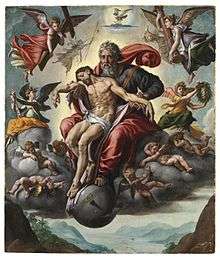Economy of Salvation

The Economy of Salvation, also called the Divine Economy, is that part of divine revelation in the Christian tradition that deals with God’s creation and management of the world, particularly his plan of salvation accomplished through the Church. From the Greek oikonomia (economy), literally, "management of a household" or "stewardship".[1][2][3][4][5][6]
It is the elements and resources revealed by God as necessary for salvation through special revelation, scriptures of the Old Testament and New Testaments. The ultimate expression of this in Christian theology according to Catholic Church teachings would be the work of salvation achieved by Jesus Christ on the cross. His sacrifice paid for our debts and therefore has made payment for our sins - and therefore we are seen as not guilty before God for our sins committed.[7]
This economy is related to a transaction:
- God gives the means of salvation through Jesus' sacrifice.
- Human beings accept it through faith.
For instance, according to this belief system, God saved Noah by commanding that Noah build the Ark for Noah's salvation. Certainly God could have spoken the Ark into existence more easily than commanding Noah to complete the task. Thus an illustration of God's Economy in Salvation. He does not do for man that which man himself can accomplish. Noah could not have foreseen the need for an ark, known the dimensions required of such a vessel, or the appropriate materials; thus God provided those. However, Noah could provide the labor and was required to do so.
Paragraph 1103 of the Catechism of the Catholic Church also refers to the "Economy of Salvation" as the "economy of Revelation."[8]
Giorgio Agamben's The Kingdom and the Glory: For a Theological Genealogy of Economy and Government (2007; Eng. translation, 2011, p. 51) argues that this concept of "economy" (oikonomia) becomes narrowed to refer to a divine plan of salvation only after the Nicene dogma is established. In early Church history, the term also encompasses the "organization of the divine life" (51).
See also
References
- ↑ Mcgrath, Alister Christian Theology: An Introduction Blackwell Publishing, 2006 p. 267 ISBN 978-1-4051-5360-7
- ↑ "The Economy, in This World and the Next". www.catholicculture.org.
- ↑ "The Economy of Salvation". fathermahars.blogspot.ie.
- ↑ "Economy of Salvation - Catholic Man Night". www.catholicmannight.com.
- ↑ "Catechism of the Catholic Church - Index - S". www.vatican.va.
- ↑ "Catechism of the Catholic Church - The Revelation of God". www.vatican.va.
- ↑ "Confirmation in the Economy of Salvation Catechism of the Catholic Church".
- ↑ The Holy See (1995). Catechism of the Catholic Church (Updated and Revised with modifications from the Editio Typica ed.). Doubleday. p. 312. ISBN 978-0-385-47967-7.
Further reading
- Conrad, A.C. The Divine Economy. Grand Rapids: Eerdmans, 1954.
- Lumen Gentium The Role of the Blessed Mother in the Economy of Salvation